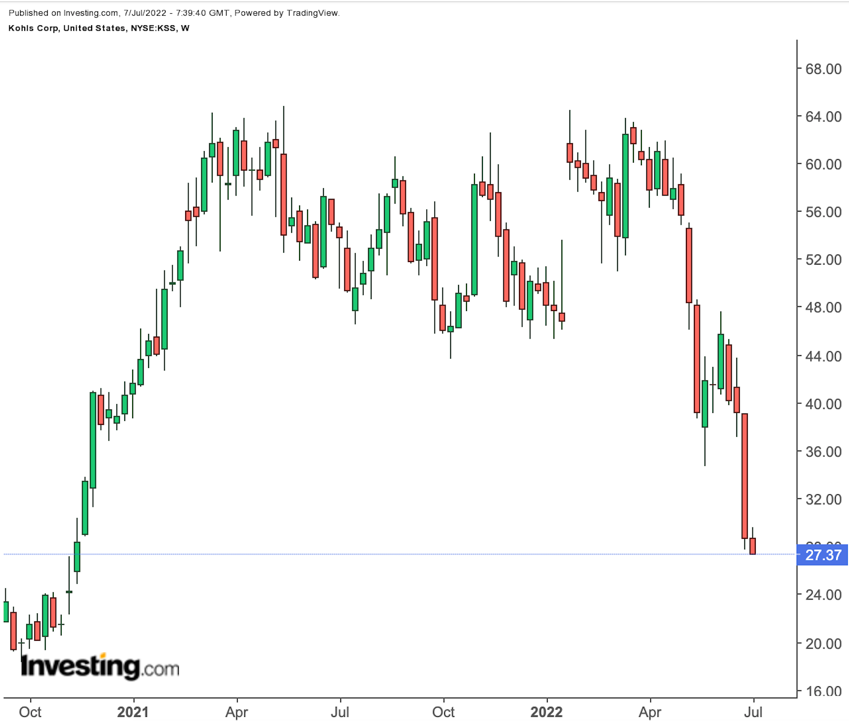This article was written exclusively for Investing.com
It seems incredibly easy to make the case for Kohl's Corporation (NYSE:KSS) stock at the moment. Relative to trailing twelve-month results, shares of the U.S. department store operator trade at just 4.3x earnings with a dividend yield of 7.3%.
And less than four months ago, the Menomonee Falls, Wisconsin based retailer was the subject of a bidding war. That was even after the company rejected buyout offers earlier this year, including one made in January for $64 in share.
Kohl's now trades at $27. Surely, the bidders willing to pay $60-plus six months ago weren't that wrong.
Well, perhaps they were.
A Ridiculously Cheap Stock
In fiscal 2018 (Kohl's fiscal years end on the Saturday closest to Jan. 31 of the following year), on an adjusted basis, Kohl's posted earnings per share of $5.60. In FY19, adjusted EPS declined 13% to $4.86.
Fiscal 2020 of course was impacted significantly by the novel coronavirus pandemic. Even on an adjusted basis (which backs out store closure costs, gains and losses on real estate sales, and other factors), Kohl's lost $1.21 per share. Then, last year, adjusted EPS soared to $7.33.
The two-year earnings growth rate between FY19 and FY21 was about 23%; go back a year and the growth rate still is over 9%.
Taking a purely fundamental perspective, KSS stock trades for 4x earnings despite those earnings growing 9% annually over a three-year stretch. That kind of combination isn't available often in this market—or in any market.
Indeed, a 4x earnings multiple suggests a business in sharp decline, rather than in growth mode. There doesn't seem to be much evidence in the results of the last few years to suggest Kohl's is on the precipice of such a decline.
Are Kohl's Earnings Set To Plunge?
But in fact, there is some evidence that results may be headed south. Obviously, fiscal 2021 results for Kohl's benefited from the country's response to the pandemic. Between sharply lower spending on travel and entertainment, plus stimulus payments from the federal government, U.S. consumers were flush last year. As a result, they spent heavily on merchandise of all kinds.
Indeed, one of the better U.S. retailers saw precisely that bump. Target (NYSE:TGT) posted adjusted earnings per share of $13.56 in its fiscal 2021—up more than 100% from the $6.39 figure posted in FY19. So far in calendar 2022, Target has cut its guidance for profit margins twice. Wall Street now expects Target's profits to decline 36% this year.
Remember that Kohl's earnings actually declined in fiscal 2019. Meanwhile, Kohl's itself posted a sharply disappointing first quarter to begin fiscal 2022. Adjusted EPS badly missed consensus estimates, and declined 90% year-over-year. Same-store sales fell 5.2%.
Kohl's profits aren't going to fall 90% for the full year, but they're going to decline. The same inventory problems that dogged Target showed up in Kohl's first-quarter report: inventory climbed $1 billion, or 37% year-over-year. Wall Street expects full-year profits to decline by 12%.
Even that estimate looks too conservative. After Q1, Street estimates imply basically flat profit growth for the last three quarters of the year. Yet all of the evidence we have in retail—whether looking at mall retailers like American Eagle Outfitters (NYSE:AEO), or e-commerce leaders like Amazon (NASDAQ:AMZN)—suggests that a) the consumer is getting weaker and b) that consumer already owns too many things.
With normalcy returning, spending is pivoting back toward travel and entertainment. For instance, U.S. air travel broke records over the July 4 weekend.
In short, it may get worse before it gets better for retailers like Kohl's. And the nature of the retail model means that relatively small movements in sales lead to big movements in profits. That was a huge boost for Kohl's earnings when sales were strong last year. It's a big risk to profits going forward.
Why Were Bidders Offering $60-Plus?
Now, again, it was only six months ago that bidders were offering $60-plus per share to acquire Kohl's. And, to be fair, that alone suggests that a price below $30 is simply too cheap.
But Kohl's itself has ended the bidding process. And retailers of all stripes have plunged from where they traded at the beginning of the year. TGT stock is down 37%. Macy's (NYSE:M) has lost almost one-third of its value. The market has rapidly adjusted to the 'new normal' for retail—which, unfortunately, may look a lot like the old normal.
And that gets to the core problem here. Before the pandemic, KSS stock went nowhere. During the 2010s, shares lost 5.6% of their value. The S&P 500 rallied 190%.
During that period, over and over investors believed that stocks like KSS were simply “too cheap.” With few exceptions, they were proven wrong. Maybe this time is different for Kohl's; maybe a sub-5x multiple to estimated earnings for this year indeed is too cheap.
But we've heard that story before. Given the pressures on the industry, and the end of the bidding process, as well as a stock market which is significantly lower, investors can probably do better elsewhere.
Disclaimer: As of this writing, Vince Martin has no positions in any securities mentioned.
***
Looking to get up to speed on your next idea? With InvestingPro+, you can find:
- Any company’s financials for the last 10 years
- Financial health scores for profitability, growth, and more
- A fair value calculated from dozens of financial models
- Quick comparison to the company’s peers
- Fundamental and performance charts
And a lot more. Get all the key data fast, so you can make an informed decision, with InvestingPro+. Learn More »
Which stock should you buy in your very next trade?
AI computing powers are changing the stock market. Investing.com's ProPicks AI includes 6 winning stock portfolios chosen by our advanced AI. In 2024 alone, ProPicks AI identified 2 stocks that surged over 150%, 4 additional stocks that leaped over 30%, and 3 more that climbed over 25%. Which stock will be the next to soar?
Unlock ProPicks AI